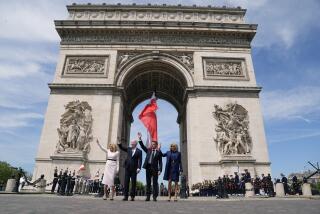Move Past the Grudges
- Share via
Shortly before the 1991 Persian Gulf War, then-Prime Minister Margaret Thatcher told the first President Bush it was “no time to go wobbly” on fighting Iraq. The current British prime minister, Tony Blair, should offer an equally stern message to the current President Bush: Do not delay in repairing relationships with the many nations angered by this war. France makes it hard to extend a hand, but a grudge match would cause damage beyond its own arena.
Blair visited Bush at Camp David last week and readily acknowledged the bruises left by the rancorous United Nations debate before the war. When Bush was asked about the many nations that declined to join the Iraq war alliance, he replied only that the United States and Britain had “plenty of Western allies” that “continue to stand with us.” Blair, however, frankly conceded that many countries “disagree with what we’re doing.” How that divide is handled, now and after the war, will affect global relationships for years to come.
Members of the U.N. Security Council, including the U.S. and France, did agree Friday to again start using Iraq’s oil money for food and medical supplies, to be delivered as the military situation allows. Even though the deal is fragile and good for only 45 days, any submersion of the bare-knuckled acrimony of recent weeks is a help.
Britain and France quarreled bitterly about whether war in Iraq was justified, yet Blair has a better chance than Bush of patching up long-term relations with France, Germany and other European countries that opposed Washington. As prime minister he has stressed the need for Britain to move closer to continental Europe; he is more supportive than the Bush administration of giving the United Nations a major role in rebuilding Iraq at war’s end, not just limiting it to feeding the starving and resettling refugees.
It is hard to imagine what France thought it would accomplish in initially blocking resumption of the oil-for-food program. But in the end it agreed to a deal. In other contexts, French officials have made known their desire to participate in contracts to fix bridges, pump oil and put up new government buildings, and they will have a better chance if the United Nations, not the United States, is in charge.
It is also in U.S. interests to let other countries assist with reconstruction. Spreading the wealth can help renew tattered alliances that will be needed to continue the worldwide fight against terrorism and to grapple with the next Kosovo, the next East Timor.
Bush has said the Sept. 11 attacks on the United States propelled him toward war with Iraq, which refused to yield its suspected chemical and biological weapons and could provide them to terrorists. Nations such as France, Germany, Russia and Turkey, though strong opponents of the war, have been strong allies in the fight against terrorism. Letting the diplomatic wounds fester may satisfy ideologues on both sides, but it won’t make the world a safer place.
More to Read
Sign up for Essential California
The most important California stories and recommendations in your inbox every morning.
You may occasionally receive promotional content from the Los Angeles Times.













